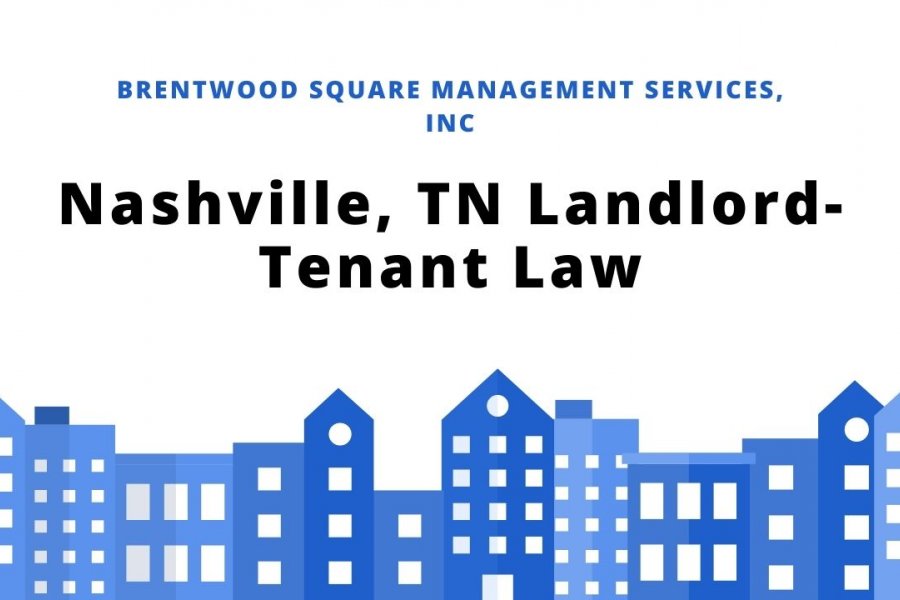
Disclaimer: Please note that the information provided in this blog is intended for general guidance and should not be considered as a replacement for professional legal advice. It is important to be aware that laws pertaining to property management may change, rendering this information outdated by the time you read it.
In Tennessee, a fairly uniform residential landlord friendly state, a tenancy is established after a tenant pays their rent in exchange for inhabiting a rental. Once that is done, both Tennessee landlords and tenants obtain certain rights and obligations under Tennessee law (Tennessee Code Ann. Title 66, Ch. 28).
It is important to familiarize yourself with Tennessee state guidelines to run a successful rental investment. So, we at Brentwood Square Management have put together this overview of the requirements, including guidance on handling lease violations, providing proper notice, and managing tenancy, to help all landlords be successful.
The Required Disclosures in Tennessee
As a landlord, you have a legal obligation, under Tennessee regulations, to provide notice and let your prospective tenant know certain information. In particular, a housing provider must make the following disclosures to comply with the requirements.

- Disclosure about lead paint concentration. Tennessee landlords who own rental homes built before 1978 must disclose this information on their residential leases due to the health risks associated with lead exposure.
- Disclosure about the owners and managers of the unit. You must provide your resident with your name and address plus the same information for any managers.
- Disclosure on where you are holding security deposits. If you require a security deposit, then your tenant has a right to know where you are holding the security deposit.
- Disclosure on rental property showings. If you wish to enter the rental to show it to prospects, then you must disclose this information on the lease agreement.
If a Tennessee housing provider fails to disclose any of these, then they may face legal action for not comply with the law.
The Rights of Tennessee Landlords
Landlords and property owners have the following rights under state law, including the right to address lease violations:
- To enter rented premises with the relevant tenant notice.
- To update the terms of the lease agreement.
- The ability to evict a tenant for non-compliance to the terms of the lease agreement.
- Reject a prospective tenant if they fail the tenant screening process.
- To enforce the terms of the written lease agreement.
- To choose not to renew the lease or rental agreement.
- Put certain restrictions on how a tenant can use the rented premises.
- To have their tenants pay rent as per the agreement.
- To remove a tenant's belongings from the rental units after an eviction proceeding via the county clerk after paying court fees.
The Responsibilities of a Tennessee Landlord
Housing provider responsibilities under landlord tenant state law include:
- Treating all Tennessee tenants with respect and fairness.
- Providing a fit and habitable condition for the unit.
- Responding to any maintenance issues and completing any necessary or agreed repairs as the resident requests.
- Ensuring the resident enjoys their property in peace and quiet.
- Following the proper eviction guidelines when removing a tenant's property.
- Abiding by all terms of the lease agreement.
- Serving the appropriate written notice when looking to update the terms of the agreement.
- To provide any necessary or agreed services as stipulated in the agreement.
- To place a tenants security deposit in a bank or lending institution within the State and only use it to cover resident expenses like utility services.
The Rights of a Tenant in Tennessee
Similarly, your renters have rights under the Tennessee landlord-tenant law, including the right to make tenant requests:
- To live in a rental unit that complies with all health, safety and building codes.
- Continuing to live in rented premises until landlords have followed the proper Tennessee eviction process.
- To live in privacy, peace and quiet, with their legal rights upheld.
- To have repairs completed within a reasonable period.
- Receiving notice of any changes to the lease terms.
- To repair and deduct as per the state laws.
The Responsibilities of Tenants in Tennessee
The following are the responsibilities Tennessee tenants have under the law:
- Serving landlords with proper notice prior to vacating the rented premises.
- Abiding by all terms of the lease or rental agreement.
- To keep noise to reasonable levels.
- To provide the landlord notice, in writing, of any required repairs.
- Notify the housing provider when planning to be away from the property for an extended time.
- To make each rent payment on time and to continue to pay rent through the duration of the rental agreement and ensuring any paid amount goes to the right place.
- To keep a habitable dwelling.
- Not breaking the lease in Tennessee.

If a tenant fails in any of these responsibilities, violates Tennessee code, landlord-tenant laws, or the tenant violates the agreement, dictated by the laws in Tennessee, they may face eviction.
An Overview of the Landlord Tenant Law in Tennessee
A landlord needs to familiarize themselves with regulations and tenancy laws to ensure their rental business remains legally complaint. Here is an overview of the Tennessee landlord tenant law:
Changing the Locks
A landlord cannot deliberately change locks on their property, even if the tenants withhold rent, as this is illegal under the Federal Fair Housing Act. However, a tenant may, in certain situations, have the legal right to change locks without seeking a landlord's permission.
Small Claims Actions
Small claims courts provide a simple and inexpensive way for parties to manage disputes or evictions. So, as a landlord, you'll need the help of a small claims court for issues of unpaid rent, evicting tenants, and security deposit deductions.
As per the Tennessee landlord-tenant laws and Tennessee landlord responsibilities, if landlords decide to file in said court, the maximum lawsuit is $25,000. Currently, rent-related cases have a 6-year statute of limitation, whereas other types of housing disputes have a 3-year statute of limitation.
Landlord Entry
The landlord-tenant act does not dictate when landlords can access the premises. In other words, when a landlord wishes to enter, they can. However, as part of Tennessee landlord responsibilities, landlords must legally give their tenant a 24-hour notice in the final 30 days of the lease if they wish to show the unit to prospects or carry out repairs.
It is also customary for landlord access to be an agreed-upon policies in the lease. The only time a landlord is not required to provide notice is in case of emergency.
Housing Discrimination and the Fair Housing Act
The landlord-tenant act and federal regulations prohibit any pattern of discrimination that may affect a prospect's ability to rent a home. These regulations ensure fair treatment in housing and address various aspects of the health and safety of rental properties. Landlords must be aware of their regulations and obligations, including providing proper notice, to comply with these standards and avoid potential legal issues.
Additionally, The Fair Housing Act protects prospective tenants from being discriminated upon based on a series of protected characteristics .
To avoid violating the Fair Housing Actt, landlords should treat all tenants equally. Contact us today if you have any questions regarding the Tennessee landlord-tenant law or Fair Housing!
Rent Increase Laws
As a landlord, there are no limits as to how much you can increase your rent price by or rent control laws that may influence the fair rental value. Consequently, you can raise your rent by however much you want, whenever you want, without serving an advance notice.
But the law states that while there isn't rent control, there are limits to the value late fees you can charge. These fees must not exceed 10% of the missing amount in late fees. Additionally, you must not charge a fee exceeding $30 for bounced checks.
Lease Termination
As per the laws, a tennessee tenant can break their lease under certain conditions such as:
- Starting active military duty.
- The lease contains an early termination clause
- The landlord failed to keep the unit habitable, as described by the building codes and the county public health department.
- Harassment by the landlord.

The Tennessee landlord-tenant act requires a landlord to make reasonable efforts to re-rent a unit after the tenant has left. This is regardless of whether the reason for leaving is legally justified or not. You may also need to provide notice and manage any security deposit for the former resident at this point as well.
Bottom Line
Understanding the landlord tenant laws is an incredibly important part of being a successful landlord. Both the landlord and the tenant must understand both their responsibilities and their rights. However, if you have any questions, like how to manage rent payments or understanding the Tennessee security deposit law and other laws in Tennessee, it's always good to contact a real estate management company.
We at Brentwood Square Management have years of experience working with the Tennessee landlord-tenant laws and provide essential services on a landlord's behalf, so if you have any questions, please contact us today.
